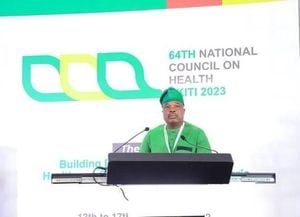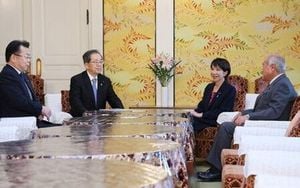It’s not every day that a sitting U.S. cabinet member stirs up a media storm with off-the-cuff remarks about one of the most notorious figures of the past decade. But that’s exactly what happened this week, when Commerce Secretary Howard Lutnick’s comments about Jeffrey Epstein sent shockwaves through Washington and the national media, prompting confusion, outrage, and a flurry of questions that refuse to be put to rest.
The drama began on October 1, 2025, when Lutnick appeared on the Pod Force One podcast with Miranda Devine. During the interview, Lutnick didn’t just touch on the subject of Epstein—he dove right in, speculating openly about the late financier’s methods and the possible existence of incriminating videotapes. According to MSNBC, Lutnick stated, “That’s what his M.O. was, you know, get a massage. Get a massage. And what happened in that massage room, I assume was on video. This guy was the greatest blackmailer ever. Blackmail people. That’s how he had money.”
It wasn’t just the content of Lutnick’s remarks that raised eyebrows, but the timing and candor. As Jen Psaki, host of MSNBC’s The Briefing and former White House press secretary, put it the next day, “I want to start with what must have been a very tough day in the White House, because typically every morning at the White House, at least the ones I’ve worked in, there is a senior staff meeting in the chief of staff’s office to discuss everything from the president’s schedule to the news of the day, to any tricky problems they’re going to have to navigate. … And judging from today’s news, this morning, must have been, well, one hell of a meeting.”
Psaki noted that Lutnick’s musings had effectively “breathed new life into the story that the Trump White House is desperately trying to wish away.” She played a clip from the podcast, highlighting Lutnick’s assertion that Epstein’s blackmail operation was at the heart of his wealth and power. “The guy was the greatest blackmailer ever. That’s how he had money. I mean, whether he meant to or not, Lutnick raises a whole lot of questions there. Questions like, who’d Epstein blackmail? Why can’t we see his financial records?” Psaki mused, adding, “And most importantly, what happened to those videos, which I am certain lots of people in Congress are looking into now?”
Lutnick didn’t stop there. He went on to speculate that there may have been a deal involving those alleged videos. “I assume way back when, they traded those videos in exchange for him getting that 18-month sentence. I have no knowledge, but my assumption is there was a trade for the videos because there were people on those videos,” he said during the podcast, as reported by MSNBC.
While the Trump administration has consistently tried to downplay or distance itself from the Epstein saga, Lutnick’s comments landed like a thunderclap. Wall Street Journal reporter Josh Dawsey, according to Psaki, tweeted that “a lot of people around the president are shaking their heads about this Howard Lutnick interview.”
The reaction wasn’t limited to Psaki’s show. On October 2, 2025, MSNBC’s Nicolle Wallace opened her own program by confessing she was “gobsmacked” by Lutnick’s interview. Wallace played the now-infamous clip in which Lutnick described living next door to Epstein, even bragging that they “shared a wall.” He also recounted bringing his wife to Epstein’s house, despite finding Epstein “gross.” Wallace couldn’t help but question the logic: “He’s so gross I brought my wife there? None of that makes sense!”
Wallace didn’t mince words about the seriousness of Lutnick’s claims. “They took videos of massages and then blackmailed them,” she quoted Lutnick, before turning to the broader implications. “We should say, despite the fact that the American Secretary of Commerce said all those things, you should know, there’s no evidence that we’re aware of at this time of wrongdoing by Bill Gates or other Epstein associates. But importantly, Lutnick is directly contradicting the Trump cabinet’s statements and their official line on the Epstein case.”
Adding to the complexity, Wallace referenced a July 2025 Justice Department memo. “This systematic review revealed no incriminating client list. There was also no credible evidence found that Epstein blackmailed prominent individuals as part of his actions.” Wallace concluded, “So, DOJ didn’t find what Lutnick told us there.” She also cited FBI Director Kash Patel’s statement that there is no conclusive evidence showing anyone was associated with Epstein’s crimes. “Like, I could connect calls from Kash Patel to Lutnick if they want to chat and get their story straight,” Wallace quipped, her incredulity clear.
For all the spectacle, there are real-world consequences brewing. House Oversight Committee Ranking Member Rep. Robert Garcia (D-CA) told CNN that the committee intends to speak to Lutnick about what he knows regarding Epstein. This development signals that, far from fading away, the controversy may soon play out in public hearings, dragging more details—and perhaps more officials—into the spotlight.
But why did Lutnick go there in the first place? As Psaki observed, “Why the U.S. commerce secretary would be speaking on a podcast at length about Jeffrey Epstein during a government shutdown? Who the heck knows? But he somehow managed to contradict the administration’s entire story when it comes to the notorious sex predator.”
The situation is made even stranger by Lutnick’s own proximity to Epstein. In his podcast appearance, Lutnick described living next door to Epstein and sharing a wall, a detail that seems to have only fueled the media’s fascination. Bringing his wife to Epstein’s home, despite calling him “gross,” left commentators like Wallace genuinely confused. “I wish I could get to the point in my job and in my life where I can’t be shocked by anything that these, you know, yahoos say, but I was gobsmacked. I watched that clip five times,” Wallace admitted on her show, as reported by Raw Story.
It’s worth noting that the Justice Department’s July memo and the FBI’s public statements have both emphasized that there is no credible evidence of Epstein blackmailing prominent individuals, nor any conclusive links between Epstein and other high-profile figures. Yet, Lutnick’s statements—whether based on personal knowledge, rumor, or speculation—have reignited a debate that many in Washington would rather leave behind.
As the House Oversight Committee prepares to question Lutnick, and the media continues to dissect every word, the episode serves as a reminder of just how combustible the Epstein story remains. The combination of unresolved questions, political sensitivities, and the unpredictable candor of public officials guarantees that this saga is far from over. For now, the White House and its allies are left to manage the fallout from a single podcast interview that, for a moment, overshadowed even the most pressing issues of the day.



